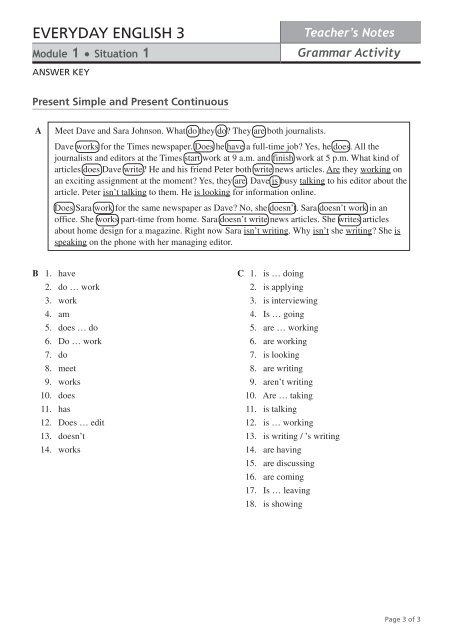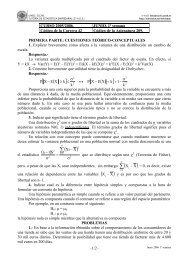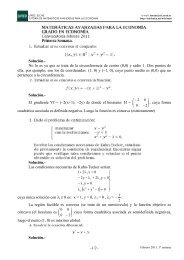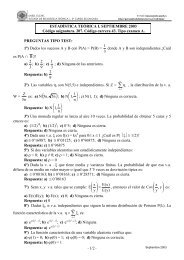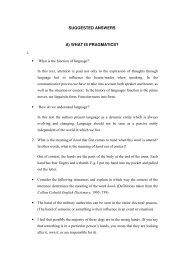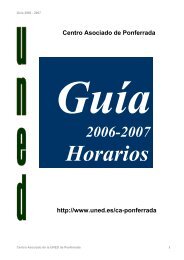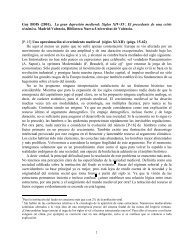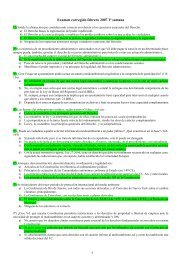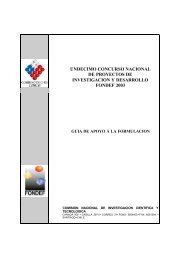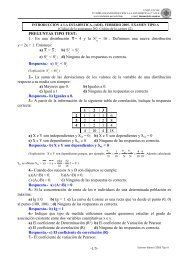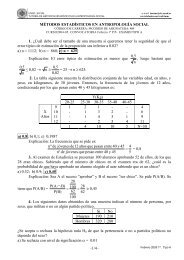EvEryday English 3 - Innova
EvEryday English 3 - Innova
EvEryday English 3 - Innova
You also want an ePaper? Increase the reach of your titles
YUMPU automatically turns print PDFs into web optimized ePapers that Google loves.
Everyday <strong>English</strong> 3<br />
Module 1 • Situation 1<br />
Answer Key<br />
Teacher’s Notes<br />
Grammar Activity<br />
Present Simple and Present Continuous<br />
A<br />
Meet Dave and Sara Johnson. What do they do? They are both journalists.<br />
Dave works for the Times newspaper. Does he have a full-time job? Yes, he does. All the<br />
journalists and editors at the Times start work at 9 a.m. and finish work at 5 p.m. What kind of<br />
articles does Dave write? He and his friend Peter both write news articles. Are they working on<br />
an exciting assignment at the moment? Yes, they are. Dave is busy talking to his editor about the<br />
article. Peter isn’t talking to them. He is looking for information online.<br />
Does Sara work for the same newspaper as Dave? No, she doesn’t. Sara doesn’t work in an<br />
office. She works part-time from home. Sara doesn’t write news articles. She writes articles<br />
about home design for a magazine. Right now Sara isn’t writing. Why isn’t she writing? She is<br />
speaking on the phone with her managing editor.<br />
B 1. have<br />
2. do … work<br />
3. work<br />
4. am<br />
5. does … do<br />
6. Do … work<br />
7. do<br />
8. meet<br />
9. works<br />
10. does<br />
11. has<br />
12. Does … edit<br />
13. doesn’t<br />
14. works<br />
C 1. is … doing<br />
2. is applying<br />
3. is interviewing<br />
4. Is … going<br />
5. are … working<br />
6. are working<br />
7. is looking<br />
8. are writing<br />
9. aren’t writing<br />
10. Are … taking<br />
11. is talking<br />
12. is … working<br />
13. is writing / ’s writing<br />
14. are having<br />
15. are discussing<br />
16. are coming<br />
17. Is … leaving<br />
18. is showing<br />
Page 3 of 3
Everyday <strong>English</strong> 3<br />
Module 1 • Situation 2<br />
Answer Key<br />
Teacher’s Notes<br />
Grammar Activity<br />
Present Simple and Present Continuous, and Stative Verbs<br />
A<br />
It isn’t a normal day at Marcus Publishing. People are running around the office. Why is everyone<br />
working so hard? They want to finish today’s newspaper. But there are some problems.<br />
Penny, the receptionist, usually takes phone calls. But today Penny isn’t feeling well and she is<br />
resting at home. The other office workers are answering phone calls today. Linda, the graphic<br />
artist, usually takes a coffee break at 10 a.m. every day, but this morning she isn’t taking a break.<br />
She doesn’t have time.<br />
Why aren’t Keith and Mandy at their desks? They usually edit the news articles, but right now<br />
they aren’t editing. Keith is showing a new journalist around the office. He knows he has a lot of<br />
work to do, so he is trying to make the tour as quick as possible. Mandy is talking to one of the<br />
journalists. She doesn’t understand his politics article and she needs him to explain it.<br />
George, the publisher, meets the editors every morning in the conference room. But today George<br />
isn’t meeting the editors. Why don’t they have a meeting? One of the best editors is on vacation<br />
and George is editing a restaurant review.<br />
B 1<br />
1. is<br />
2. has<br />
3. works<br />
4. start<br />
5. finishes<br />
6. is leaving<br />
7. is happening<br />
8. isn’t / is not going<br />
9. is taking<br />
2<br />
1. is going 4. is helping<br />
2. answers 5. show<br />
3. isn’t sitting 6. are introducing<br />
C 1. b<br />
2. c<br />
3. a<br />
4. b<br />
5. a<br />
6. b<br />
7. c<br />
8. b<br />
9. b<br />
10. c<br />
3<br />
1. edits<br />
2. is<br />
3. are … working<br />
4. am writing / ’m writing<br />
5. Don’t … write<br />
6. isn’t<br />
Page 3 of 3
Everyday <strong>English</strong> 3<br />
Module 1 • Situation 3<br />
Answer Key<br />
Teacher’s Notes<br />
Grammar Activity<br />
Imperatives<br />
A<br />
Barry starts work as a journalist for a newspaper. Someone shows him<br />
around the office and gives him the following tips:<br />
• Be on time for work.<br />
• Make a list of your appointments.<br />
• Don’t be late for meetings.<br />
• Record all your interviews.<br />
• Pay attention to what your editor tells you.<br />
• Click on the network folder to connect to the network.<br />
• Remember to turn off your computer at the end of the day.<br />
• Don’t use this photocopier.<br />
• Always be on time with your articles.<br />
• Report to your editor, Susie.<br />
• Take a one-hour lunch break.<br />
B 1. f 2. h 3. a 4. c 5. b 6. g 7. e 8. d<br />
C<br />
Note: The activity also requires changes in pronouns because Ed is addressing the people directly.<br />
1. Look at the changes in the network folder.<br />
2. Don’t use the photocopiers.<br />
3. Remember not to drink coffee near your computers.<br />
4. (Brian), write a new article about body language. / Write a new article about body language,<br />
Brian.<br />
5. (Brian), don’t forget to give your restaurant review to Susan today. / Don’t forget to give your<br />
restaurant review to Susan today, Brian.<br />
6. (Betty), show me the design for the new website. / Show me the design for the new website, Betty.<br />
7. (Susan and Joe), don’t forget to give your reports to me later today.<br />
8. (Mike), please interview a new journalist at 10 a.m. / Please interview a new journalist at 10 a.m.,<br />
Mike.<br />
9. (Mike), don’t be late for your appointment with the publisher of Glam Magazine.<br />
10. (Sylvia), don’t forget to call someone to fix the photocopiers. / Don’t forget to call someone to fix<br />
the photocopiers, Sylvia.<br />
Page 3 of 3
Everyday <strong>English</strong> 3<br />
Module 1 • Situation 4<br />
Answer Key<br />
Teacher’s Notes<br />
Grammar Activity<br />
Gerunds and Infinitives, Would + like / love / enjoy / hate<br />
A<br />
Sue and Paul are trying to decide what they want to study.<br />
Sue would like to go to university. What would she like to study? She doesn’t know. A career<br />
counselor asks her about her hobbies. What does she enjoy doing? Sue is very creative. She loves<br />
designing clothes. Does she want to be a fashion designer? Yes, she would love to be a fashion<br />
designer, but she hates sewing. Sue also likes working on the computer. Maybe she would like to<br />
be a graphic designer or a computer programmer.<br />
Paul wants to be either a journalist or a chef. What kind of articles does he enjoy writing? He<br />
loves writing about news and politics. Does Paul want to work in a newsroom? No, he doesn’t.<br />
He dislikes working under pressure and would hate to sit in an office all day. Paul loves cooking.<br />
Would Paul like to study at cooking school? The career counselor thinks he would.<br />
B 1. Jessie loves designing clothes / to design clothes.<br />
2. Both Lola and Carl enjoy being creative.<br />
3. Lola likes sewing / to sew / being creative.<br />
4. Lola hates working on the computer / to work on the computer.<br />
5. Carl dislikes writing.<br />
6. Both Jack and Jessie hate working in an office / to work in an office.<br />
7. Jessie also dislikes cooking.<br />
8. Jack likes traveling / to travel / writing articles about travel.<br />
9. He also enjoys writing articles about travel.<br />
10. Carl really enjoys designing websites.<br />
C 1. to be<br />
2. doing<br />
3. writing / to write<br />
4. to be<br />
5. to write / writing<br />
6. to work / working<br />
7. sitting<br />
8. to work / working<br />
9. to do / doing<br />
10. designing<br />
11. to study<br />
12. sewing<br />
Page 3 of 3
Everyday <strong>English</strong> 3<br />
Module 1 • Situation 5<br />
Answer Key<br />
Teacher’s Notes<br />
Test<br />
A 1. am<br />
2. has<br />
3. Are<br />
4. pay attention<br />
5. turn off<br />
6. are not / aren’t<br />
B 1. are interviewing<br />
2. is publishing<br />
3. am making<br />
4. is not / isn’t working<br />
5. are not / aren’t turning on<br />
6. Is … suggesting<br />
C 1. a<br />
2. b<br />
3. b<br />
4. a<br />
5. a<br />
6. b<br />
D 1. like<br />
2. have<br />
3. is changing<br />
4. interview<br />
5. is introducing<br />
F 1. to connect<br />
2. Connecting<br />
3. to introduce<br />
4. sewing<br />
5. introducing<br />
6. editing<br />
7. to edit<br />
G 1. a<br />
2. b<br />
3. a<br />
4. b<br />
5. b<br />
6. b<br />
H 1. journalist<br />
2. newspaper<br />
3. love<br />
4. editor<br />
5. staff<br />
6. graphic designer<br />
7. articles<br />
8. online<br />
E 1. a<br />
2. b<br />
3. a<br />
4. b<br />
5. b<br />
6. c<br />
Page 1 of 1


